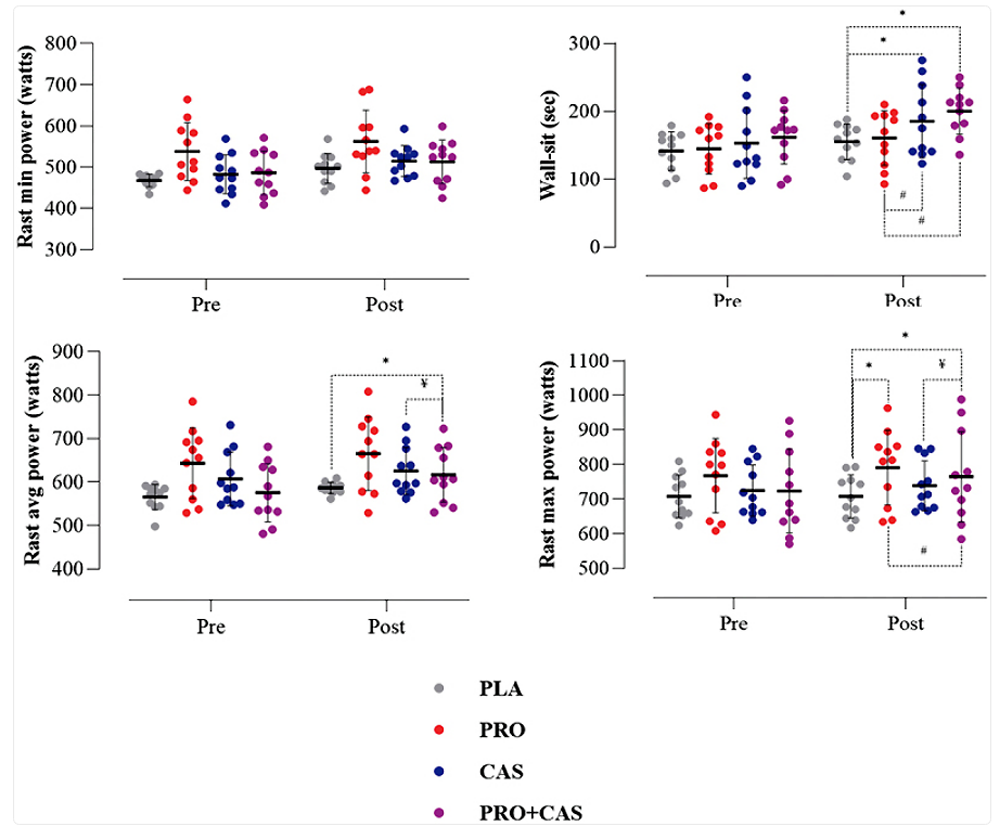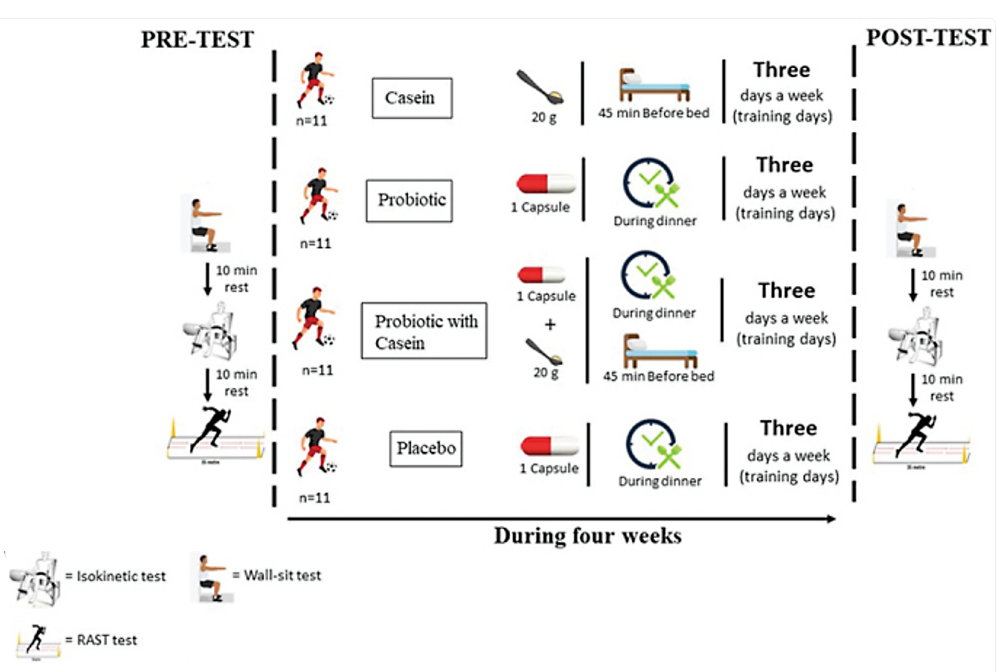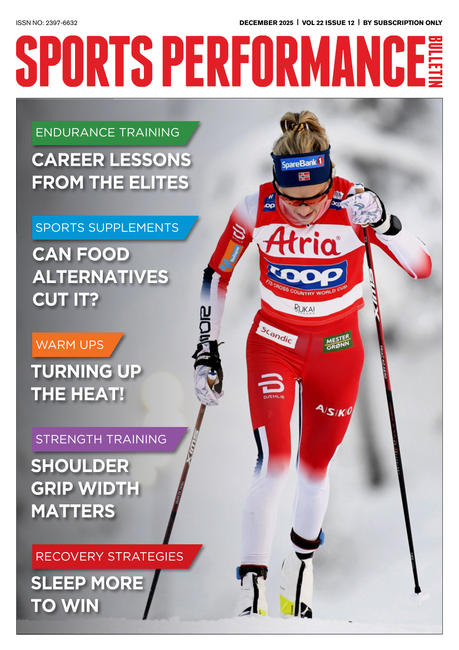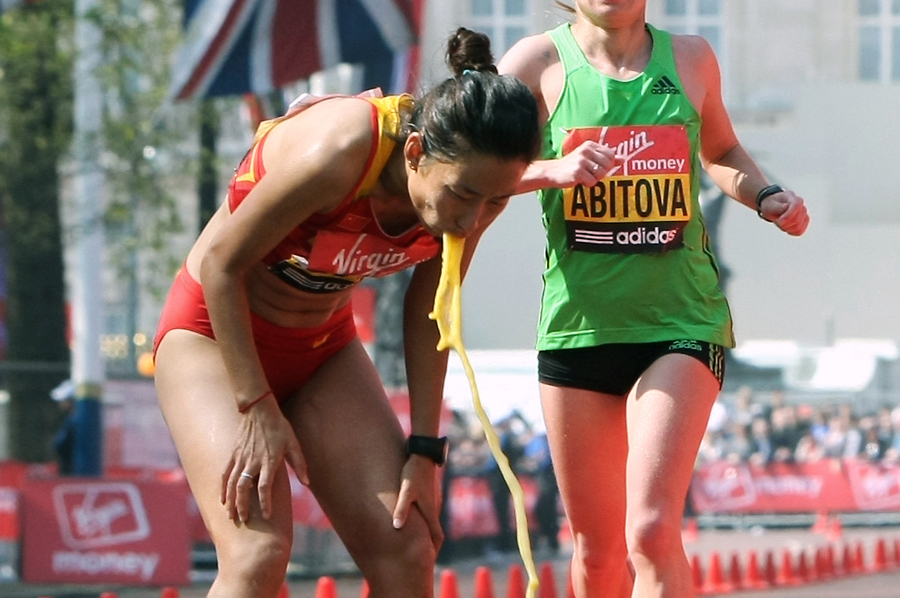You are viewing 1 of your 1 free articles. For unlimited access take a risk-free trial
The protein-probiotic connection: a match made in heaven?
Bedtime protein consumption can aid recovery, but can it be made even more effective with synergistic nutrients? SPB looks at new research
In my early days, I once managed a gym, and one of the most regular and enthusiastic attendees was a young lad who worked by day as a gardener for the council and trained religiously most nights. He was extremely fanatical about training and his goal was to become as strong as possible. He came in one evening and while chatting to him, I asked how work was going. “I was sacked today” he replied. I asked him why and he explained “I was asked to stack some hay bales this morning but I refused because it would have interfered with my shoulder session at the gym this evening.” The point of this anecdote is to underline just how far some people who are hooked on strength training will go to get gains!
Muscle growth and sleep
When it comes to maximizing strength and muscle gains, many of the nutritional recommendations that have now been confirmed by research were first pioneered by ‘enthusiastic’ experimentation and anecdotal reports emanating from the strength training community. A good example was the practice of consuming milk protein at bedtime, prior to sleep. The rationale used by strength athletes for this practice was simple; during an 8-hour sleep with no protein ingestion, the level of amino acids (the building blocks of proteins) will inevitably decline, thus impairing the ability of muscles to recover and grow following the previous day’s training. The strategy of topping up blood amino acid levels overnight with a slow-digesting protein (eg casein from milk) right before bedtime could help counter this effect, resulting in superior strength and muscle gains.
Like many other intuitive nutritional strategies, it turned out that this was indeed true. A number of scientific studies have since shown that consuming protein just prior to sleeping can enhance muscle mass gains during periods of hard training, and even prevent muscle mass loss during periods when no training is carried out(1-4).
Incidentally, this ‘protein before bedtime’ effect can also be relevant for endurance athletes. Not only is protein important for endurance athletes for repairing and rebuilding muscle tissue after hard training (for example in running where the continuous pounding action can break down muscle tissue(5)), but it is also needed to build the enzymes and mitochondrial structures (the ‘energy factories’ within muscle cells) that liberate energy in the presence of oxygen, which are made of proteins as well. It’s logical to assume therefore that by consuming extra protein, the regeneration and repair/synthesis of muscle mitochondria could be boosted, and this indeed has been shown to be the case(6). To read more about the mitochondria-boosting effect of pre-bedtime protein, and which kind of bedtime protein intake is best for endurance athletes, readers are directed to this excellent article by SPB contributor Andrew Sheaff.
More than just protein?
The evidence for ingesting pre-bedtime protein in order to boost muscle mass/strength and to help recovery and mitochondria synthesis in strength and endurance athletes respectively is pretty robust. However, some researchers have speculated that if athletes are going to be consuming pre-bedtime protein, they may get extra benefits from the addition of other nutrients to the protein. One nutrient that may be a candidate for co-ingestion with bedtime protein to aid recovery is a probiotic. That’s because periods of intense training can disrupt the delicate balance of the gut microbiota, which in turn can affect an athlete’s performance and health(7,8). This can happen because there is a direct relationship and coordination between the gut microbiota and energy metabolism and nutrient absorption.
By maintaining gut health, the energy availability and the structure of the gut microbiota can be improved, thus enhancing the absorption process of nutrients such as amino acids from proteins(8). There are many pathways by which different strains of probiotics can help activate nutrient absorption from the gut. For example, certain strains such as B. coagulans can improve the health of intestinal mucosal cells by reducing inflammation and promoting optimal development of the villus absorption zone(9). L. plantarum meanwhile can help maintain intestinal permeability (for the transport of nutrients) and enhance antioxidant capacity(10). It is for this reason that researchers now believe that using a multi-strain probiotic may yield more performance advantages in athletes than single-strain probiotic.
The perfect protein/probiotic combination
If pre-sleep protein enhances recovery and adaptation, and probiotics enhance nutrient absorption, is there a perfect combination, and are the benefits synergistic? Caesin is often recommended for active individuals as a good protein to take before bedtime(11). That’s because casein is insoluble in water and coagulates in the stomach, resulting in a much slower amino acid release from the stomach, and therefore a steady increase and more sustained blood amino acid concentration(12). In this respect, bedtime casein is preferable to the faster releasing whey protein, which is better suited for immediate post-exercise recovery (ingestion of which can be repeated at 2-3 hourly intervals through the day).
What about probiotic intake to accompany casein? One lone study by Jager et al. showed that probiotic supplements combined with casein can reduce muscle damage indicators, improve recovery, and maintain physical performance after intense and damaging exercise(13). However, the results of other studies giving probiotics are contradictory, finding no difference in swimming performance when Bifidobacterium was supplemented(14), no improvements in the speed, power, strength, and agility of badminton players when Lactobacillus casei was supplemented(15), and no improvements in 1-RM strength (chest press, deadlift, and squat) and vertical jump height of female athletes who took Bacillus subtilis(16).
One explanation for the confusion is that nearly all of the studies on probiotics and athletic performance have utilized only a single strain of probiotic (with or without protein). However, consuming a multi-strain probiotic with casein is known to positively affect protein digestion and absorption. This is turn should be able to accelerate recovery and muscle protein synthesis, while improving the function of the ‘gut-muscle axis’ and balancing intestinal gut flora.
New research
With the above mind, a new study by team of Iranian researchers has investigated the effects of simultaneous pre-bedtime consumption of a multi-strain probiotic plus caesin on athletic performance – specifically anaerobic power, lower-body-specific strength, and power-related performance measures such as sprint speed and acceleration(17). Published in the Journal of the International Society of Sports Nutrition, this study aimed to evaluate the impact of pre-sleep casein intake, combined with multiple probiotic strains on a number of key performance parameters in soccer players playing at an elite level.
Forty-four male soccer players (average age 23 years) were recruited for the study, all of whom were playing in the First Division League of Iran. Before moving onto the experimental phase of the study, all the players underwent a variety of baseline performance tests. These were:
· Wall squat test (holding a static position)- a practical and reliable method to assess lower-body isometric strength and endurance, targeting critical muscle groups such as the quadriceps, hamstrings, and gluteal muscles.
· Isokinetic strength testing – to assess absolute peak muscle torque (APT), relative peak torque (RPT), average peak torque (AvPT), time to peak torque (TPT), and average rate of force development (AvRFD).
· Running-based anaerobic sprint (RAST) tests- to assess anaerobic maximum (RAST max power), anaerobic average (RAST avg power) and anaerobic power-to-weight ratio.
The intervention protocol
In the 4-week intervention, the soccer players were randomly divided into four groups of 11, which were as follows:
· Probiotics only – where the players were given one probiotic capsule (containing eight bacterial strains: Lactiplantibacillus plantarum BP06, Lacticaseibacillus casei BP07, Lactobacillus acidophilus BA05, Lactobacillus bulgaricus BD08, Bifidobacterium infantis BI04, Bifidobacterium longum BL03, Bifidobacterium breve BB02, and Streptococcus thermophilus BT01), with a total dose of 4.5 × 1011 colony forming units [CFU]) at dinner time.
· Casein only – where the players consumed 20 grams of casein powder 45 minutes before retiring for bed.
· Probiotics + casein – where the players were given one probiotic capsule at dinner and 20 grams of casein powder 45 minutes before bedtime.
· Placebo – where the players were given one red capsule (containing grams of inert starch) during dinner.
All participants were instructed to take the supplements only on training days (three times a week), where they continued with their soccer training. At the end of the 4-week intervention, the baseline tests were repeated to investigate what differences (if any) had occurred. Figure 1 shows the overall study protocol.
Figure 1: Testing and intervention protocol
The findings
The key findings after four weeks of supplementation and training were as follows:
· Absolute peak torque (force) significantly increased significantly compared to placebo in both the casein-only and casein + probiotic groups.
· The average rate of force development at 180° per second in the leg extension increased significantly in the probiotic group compared to placebo.
· At 60o per second, the average rate of force development in the hamstring curl increased significantly in the casein + probiotic compared to all the other groups.
· Furthermore, the average rate of force development at 180° per second during the hamstring curl increased significantly in the probiotic + casein group compared to casein only.
· In the RAST running test, the average power increased dramatically in probiotic + casein group compared to both placebo and casein only (figure 2).
· Additionally, the wall-squat test demonstrated a significant increase in probiotic + casein compared to placebo and probiotic only (figure 2).
Figure 2: RAST test and wall squat test pre- and post-supplementation

Practical implications for athletes
In their summing up, the study authors concluded that “The simultaneous consumption of casein and probiotics significantly improved anaerobic power, isokinetic strength, and lower-body muscular endurance in male soccer players. These enhancements were more pronounced than those observed with casein or probiotics alone, suggesting a synergistic benefit of combined supplementation for athletic performance.” The take-home message here is that while consuming some slow-releasing protein such as casein prior to bedtime is good for recovery and adaptation, combining this protein with a multi-strain probiotic is even better!
Other than cost, there are no downsides for athletes who take a combination of casein (most easily consumed as milk protein) and multi-strain probiotics. In fact, there are just upsides, as performance apart, improving gut health through probiotic use only brings good things for health and immunity (see this article). Therefore, it is hard not to recommend this strategy for athletes who are in hard training and want to accelerate recovery and strength gains.
In this study 20 grams of bedtime protein was taken and produced good results when combined with probiotics. However, in other studies, 40 grams or so of bedtime protein intake has been recommended. This suggests a range of bedtime protein intakes will work. The amount of protein you take can be guided by your own situation. If you are training hard and are a heavier athlete, you may wish to supplement at the top end of this range. Smaller/lighter athletes or athletes who have trained less intensely may wish to experiment at lower intake.
Regarding probiotic intake, make sure you take a multi-strain supplement, including at least some of the strains mentioned above. You should aim for a dose of 50 billion CFUs or more. A final word for endurance athletes; a probiotic and bedtime protein combination will likely be superior for you too. However, you may prefer to use whey protein rather than casein or milk protein as it has been shown to produce a slightly greater gain in mitochondrial density compared to casein(18).
References
1. Nutrients. 2022 May 30;14(11):2289
2. Nutrients. 2016 Nov 28;8(12):763
3. J Nutr. 2013 Nov;143(11):1848S-1851S
4. Front Nutr. 2019 Nov 29:6:181
5. Int J Environ Res Public Health. 2021 Mar 9;18(5):2782
6. Med Sci Sports Exerc. 2015 Jan;47(1):82-91
7. Nutr Rev. 2008;66(6):310–320
8. J Int Soc Sports Nutr. 2019;16(1):1–44
9. Met Find Exp Clin Pharmacol. 2010;32(2):129–132
10. Int J Biol Macromol. 2017;103:1173–1184
11. J Int Soc Sports Nutr. 2018;15(1):1–9
12. Int J Allied Health Sci Pract. 2022;20(2):8
13. Probiotics Antimicrob Proteins. 2018;10(4):611–615
14. Sports. 2018;6(4):116. doi: 10.3390/sports6040116
15. Nutrients. 2021;13(6):1783
16. J Strength Cond Res. 2020;34(11):3173–3181
17. J Int Soc Sports Nutr. 2025 May 12;22(1):2505184
18. Sports Med. 2023 Mar 1. doi: 10.1007/s40279-023-01822-3
Newsletter Sign Up
Testimonials
Dr. Alexandra Fandetti-Robin, Back & Body Chiropractic
Elspeth Cowell MSCh DpodM SRCh HCPC reg
William Hunter, Nuffield Health
Newsletter Sign Up
Coaches Testimonials
Dr. Alexandra Fandetti-Robin, Back & Body Chiropractic
Elspeth Cowell MSCh DpodM SRCh HCPC reg
William Hunter, Nuffield Health
Keep up with latest sports science research and apply it to maximize performance
Today you have the chance to join a group of athletes, and sports coaches/trainers who all have something special in common...
They use the latest research to improve performance for themselves and their clients - both athletes and sports teams - with help from global specialists in the fields of sports science, sports medicine and sports psychology.
They do this by reading Sports Performance Bulletin, an easy-to-digest but serious-minded journal dedicated to high performance sports. SPB offers a wealth of information and insight into the latest research, in an easily-accessible and understood format, along with a wealth of practical recommendations.
*includes 3 coaching manuals
Get Inspired
All the latest techniques and approaches
Sports Performance Bulletin helps dedicated endurance athletes improve their performance. Sense-checking the latest sports science research, and sourcing evidence and case studies to support findings, Sports Performance Bulletin turns proven insights into easily digestible practical advice. Supporting athletes, coaches and professionals who wish to ensure their guidance and programmes are kept right up to date and based on credible science.











